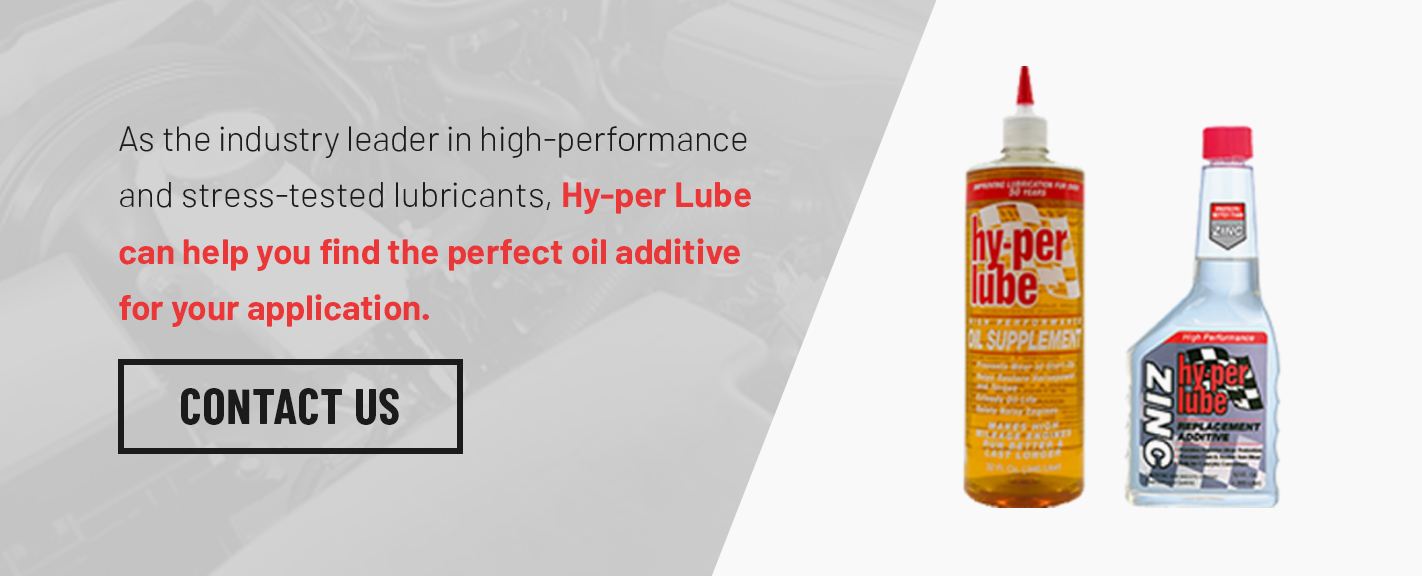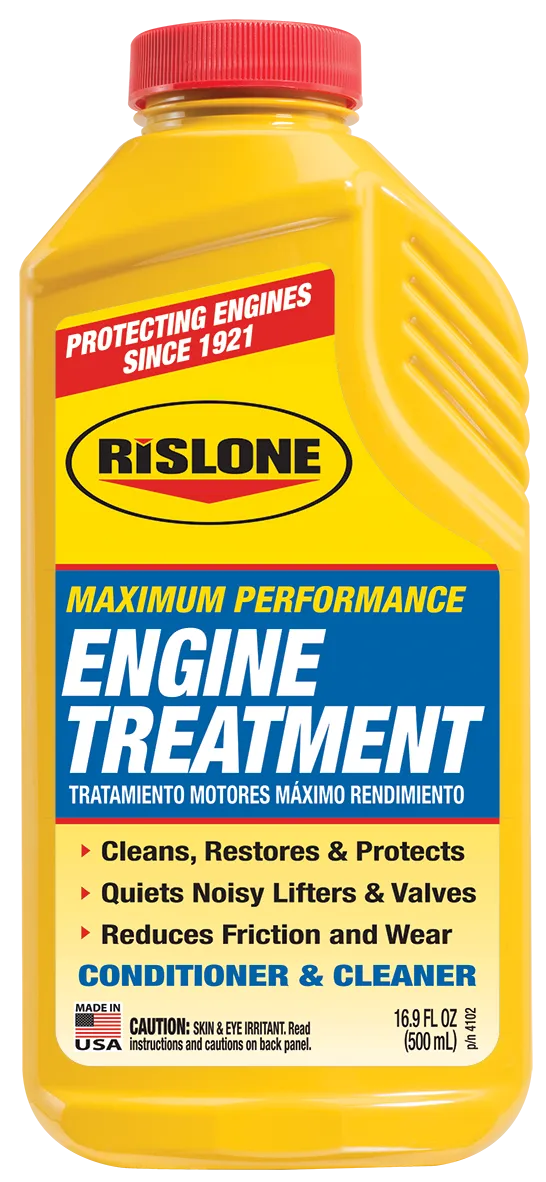Are Oil Additives Necessary?
Oil additives have always been a subject of controversy among automotive enthusiasts and mechanics. While some say that oil additives are not worth the hype, others swear by these products to improve the performance and lifespan of their engine. Those who use oil additives boast numerous benefits such as better fuel mileage, longer service intervals and reduced engine noise. But are engine oil additives worth it?
In this article, we will take a closer look at how oil additives work and the different types of oil additives available. By considering the potential benefits of using oil additives in your vehicle, you can decide if engine oil additives are the right choice for you.
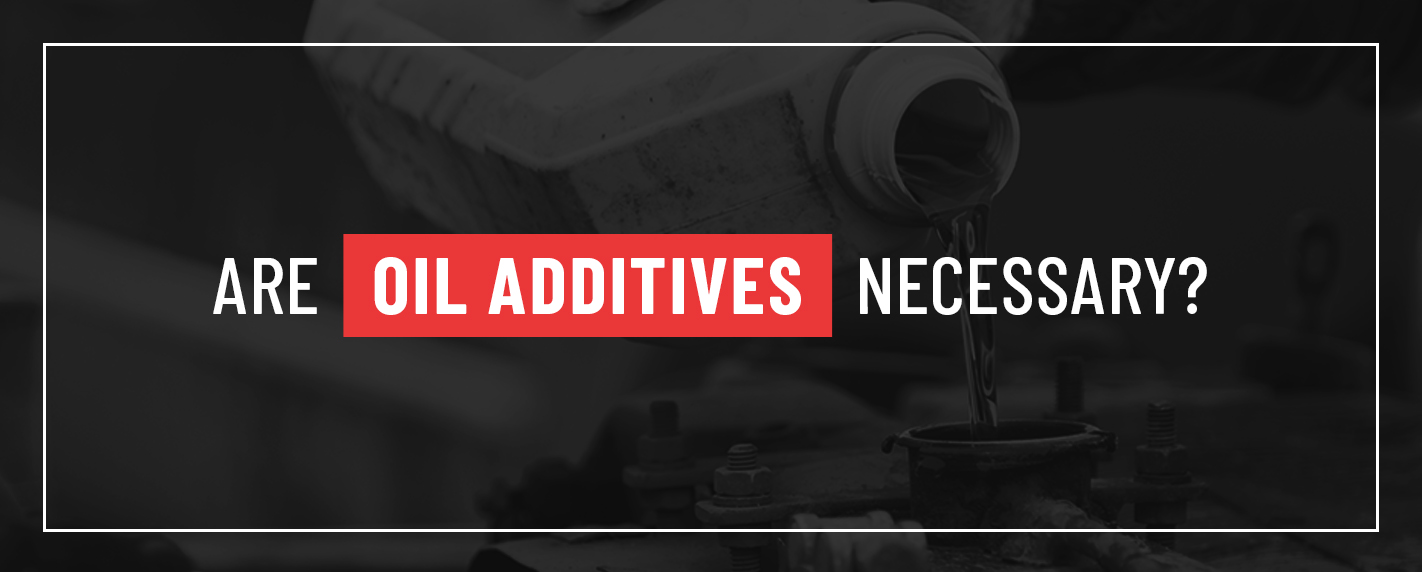
What Are Oil Additives?
The primary purpose of motor oil is to lubricate your engine and reduce friction between moving parts. However, motor oil also serves several other critical functions in your engine. It protects against corrosion, removes contaminants, prevents sludge build-up and helps cool the engine. Because motor oil cannot do all of this on its own, oil additives are included to improve motor oil performance.
Oil additives are chemical compounds added to a base oil during manufacturing or through aftermarket oil supplements. Different oil additives can be selected to enhance the desirable properties of a particular oil for specific applications. For example, engine oil additives may be used to help a dirty diesel engine run cleaner or to improve seals and block leaks in an older engine. Most motor oil contains about 15 to 30% oil additives straight off the shelf. Aftermarket oil supplements can also be used to further enhance oil and engine operation.
Without oil additives, motor oil cannot fulfill its essential functions. However, motor oil may lack important oil additives due to several factors. Motor oil naturally degrades over time due to oxidation and decomposition. Additives in motor oil can also be lost through separation by filtration or settling, or through adsorption of oil additives onto particles, metal and water surfaces. In some cases, low-quality engine oil may be missing critical additives from the start due to poor formulation. Generally speaking, the longer oil is used, the more additives will be lost.
Over time, using motor oil that lacks important additives can cause increased wear and tear on your engine. It may result in poor fuel economy, rust and corrosion, oil sludge, overheating, breakdowns and other serious engine damage. Aftermarket oil additives can improve oil performance between oil changes and protect your engine in the long run.
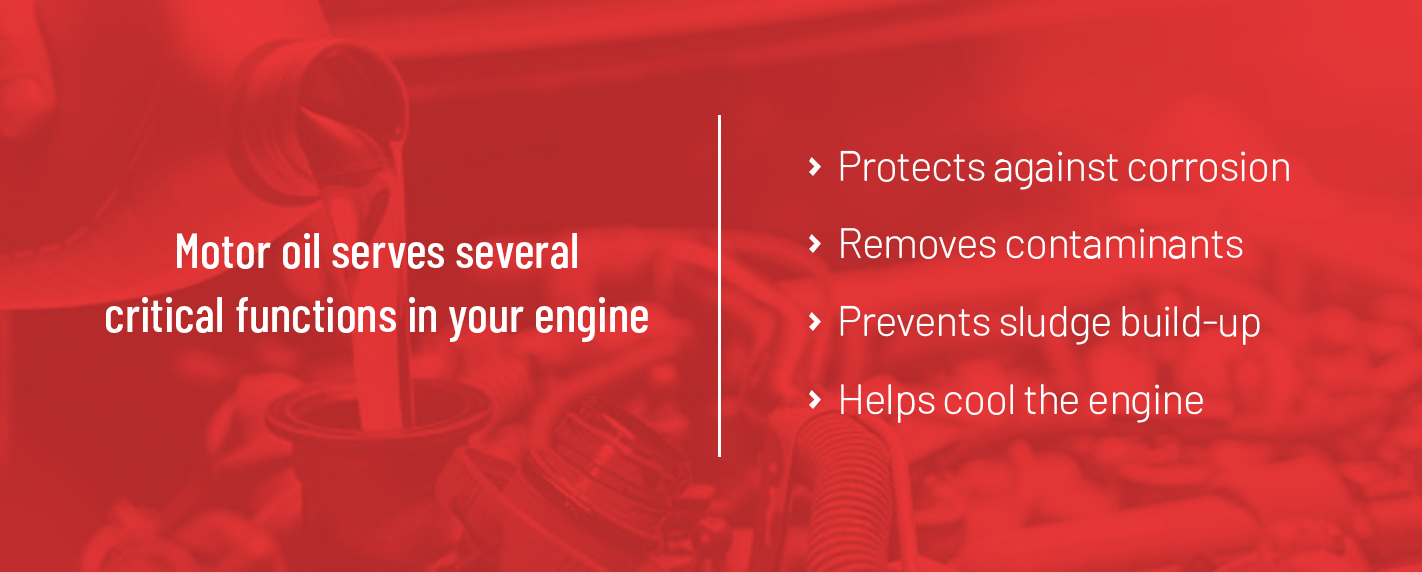
Types of Oil Additives
Various types of oil additives are available to suit different applications and engines. Some engine oil additives aim to control chemical breakdown in oil, while others improve viscosity, promote cleanliness, disperse deposits and prevent corrosion. Conventional and synthetic motor oils typically contain a mixture of several types of oil additives formulated for a certain type of engine. Aftermarket oil supplements may contain a single type of oil additive to address a particular problem or a blend of additives to improve overall engine health.
Here are the primary types of oil additives found in motor oil and aftermarket oil supplements:
1. Viscosity Modifiers
Often regarded as the best engine additive, viscosity modifiers improve an oil’s viscosity index. As oil is heated and cooled in an engine, its viscosity changes. An oi’s viscosity index indicates how much the viscosity changes. If a motor oil fluctuates significantly in viscosity, it will become too thin at high temperatures and too thick to flow properly in the cold. Viscosity modifiers, also known as viscosity index improvers (VIIs), maintain the viscosity of your motor oil within an acceptable range no matter what temperature it is outside.
2. Anti-Wear Additives
Anti-wear oil additives coat engine parts and surfaces to protect them from wear. These heat-activated oil additives react with metal to form a thin lubricating film. By improving engine lubrication, anti-wear additives reduce friction and prevent engine seizure, even if the motor oil’s lubricating film has degraded. Some anti-wear engine oil additives also slow oxidation and prevent corrosion.
Most anti-wear additives contain the phosphorus compound zinc dithiophosphate (ZDDP). Although ZDDP provides sufficient lubrication, it may also increase emissions and shorten the service life of your catalytic converter when it is present in exhaust gas. Hy-per Lube offers a Zinc Replacement Additive that is formulated without ZDDP to lubricate your engine effectively while also lowering emissions and protecting your catalytic converter.
3. Corrosion and Rust Inhibitors
Corrosion and rust inhibitors protect your engine from damaging chemical breakdown by neutralizing acids in your motor oil and slowing oxidation. Typically made with barium sulfonate and calcium, these engine oil additives create barriers on metal engine components to repel water and prevent rust and corrosion.
4. Detergents
Detergents are designed to keep your engine running clean by removing deposits from engine parts and preventing rust. Detergents neutralize oil impurities and acids created during oxidation. Because detergents keep engine oil deposits and impurities soluble, these types of oil additives are crucial for preventing oil sludge in your vehicle’s engine.
5. Dispersants
A partner to detergents, dispersants help prevent deposition and sludge by suspending solid particles in your engine oil. Dispersants keep your engine clean by preventing particles and impurities from settling on metal components. Dispersants also help maintain the viscosity of your engine oil for reliable performance at any temperature.
6. Antifoamants
Antifoamants are oil additives designed to prevent motor oil from foaming as it moves through the engine. Antifoamants reduce the surface tension between air bubbles and engine oil, allowing them to pop and dissipate more easily. Without antifoaming additives, motor oil can produce small air bubbles that cause oil pressure loss and cavitation. Oil foaming also reduces engine lubrication and eventually results in corrosion. Because of this, antifoamants also indirectly protect against corrosion by preventing foaming of engine oil.
However, when using antifoamants, take care not to add too much. If used in excess, these oil additives can have a reverse effect and actually increase the production of air bubbles. Antifoaming engine oil additives should be used in concentrations around 20 parts per million or lower.
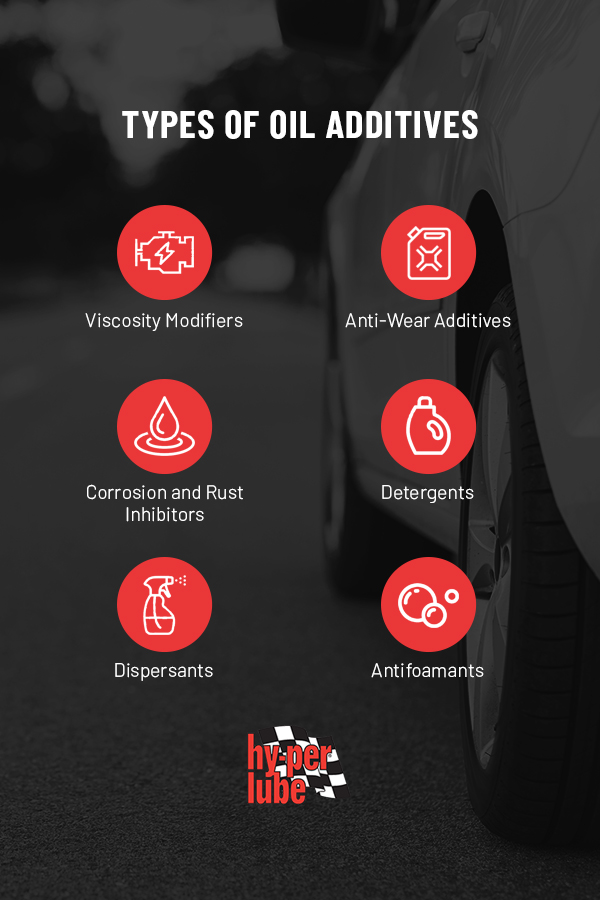
When choosing the best engine additive for your vehicle, consider the composition of your motor oil and areas it may be lacking. Read the instructions on the oil additive to ensure it is compatible with your motor oil and will not counteract other additives that may be present. When you supplement your oil with a high-quality aftermarket oil additive, you can improve engine performance and reduce wear and tear in the long run.
How Do Oil Additives Work?
Oil additives are designed to improve the performance of your engine and the oil inside it. How they achieve that varies based on the type of oil additive. While some oil additives coat internal components of your engine to improve lubrication, others induce beneficial chemical reactions inside the oil that slow oxidation and degradation.
Lubricating oil additives — like the Hy-per Lube Oil Supplement — coat metal surfaces inside your engine through a chemical reaction. When you start your vehicle after adding an engine oil supplement, the additive mixes with your motor oil and is pumped through the engine. Oil additives with superior film strength will cling to all of the internal components of your engine.
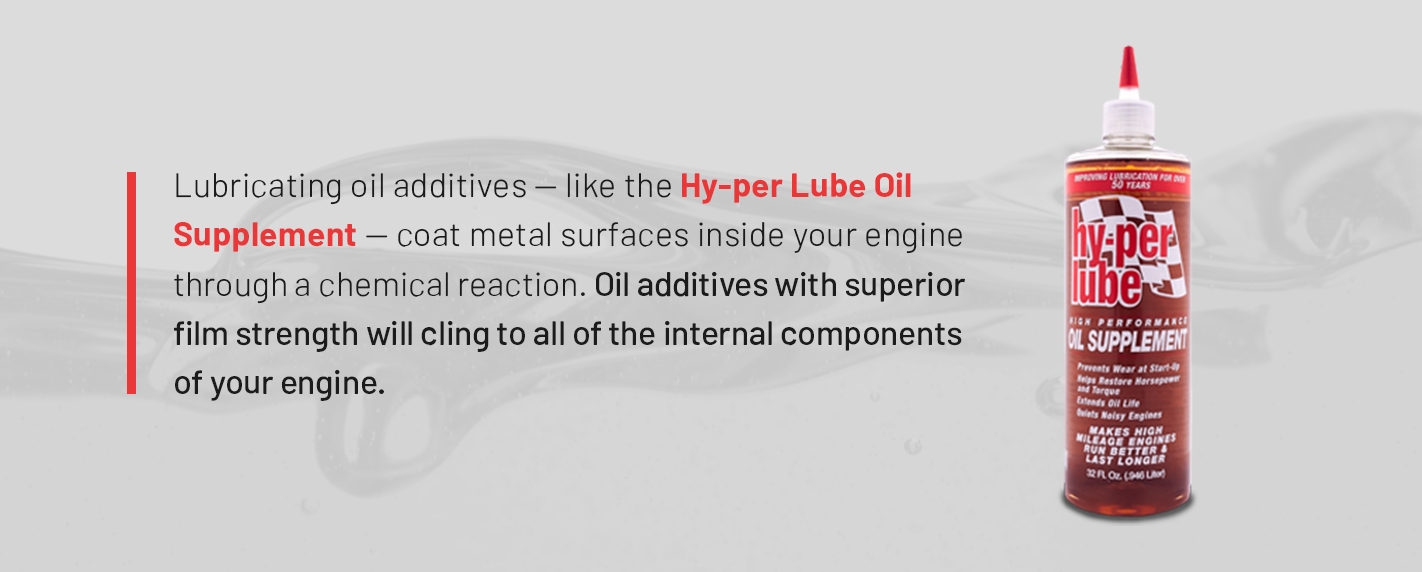
The film created by anti-wear engine oil additives has a lower shear strength than the metal components, allowing it to prevent metal-to-metal contact. Effective oil additives cling to walls of your engine and engine parts long after your engine is shut off. This enables oil additives to create a lasting protective coating in your engine and eliminate start-up wear.
High-quality engine oil additives also seal valve guides and piston rings in your engine. This helps restore engine compression, which reduces oil consumption and improves fuel efficiency. In vehicles with high mileage, engine oil additives also help restore torque and horsepower. When your engine operates more efficiently, this also reduces exhaust smoke and keeps your engine healthier.
Is an Oil Additive Necessary for My Car?
Once you understand how engine oil additives work, the benefits of these performance additives should be clear. However, you may still be wondering, “Why do I need an oil additive if most motor oil already contains these important additives?” The answer to that question is a bit more complex.
Although aftermarket oil additives are not required for your car to run, they provide significant benefits that improve the performance and longevity of your engine. When you choose the best engine additive for your application, you can enjoy more reliable long-term vehicle operation as well as longer service intervals. For older vehicles and those with high mileage, oil additives can even help restore the engine to previous operating conditions.
In the end, car owners should consider the age, mileage and condition of their engine to determine if oil additives are necessary for their vehicle. Here are a few signs that your vehicle may benefit from an oil additive:
1. Vehicles With High Mileage
The more miles you put on your car, the more stress the engine receives. Each time you drive, your engine oil accumulates deposits, creates friction between moving parts and causes general wear and tear. Additionally, high mileage on your vehicle likely means your engine is operating at less than maximum performance and is more susceptible to damage. Vehicles with higher mileage may also need oil changes more frequently, which increases your expenses.
Oil additives can effectively reduce wear and stress on your engine to boost its long-term performance. Lubricants like antifoamants and anti-wear oil additives coat engine parts to prevent stiffness and seizure. Detergents and dispersants can prevent oil sludge and grime build-up to keep high-mileage engines operating cleanly and allow longer intervals between oil changes. When paired with high-quality engine oil, aftermarket oil supplements can keep a high mileage vehicle in top operating condition.
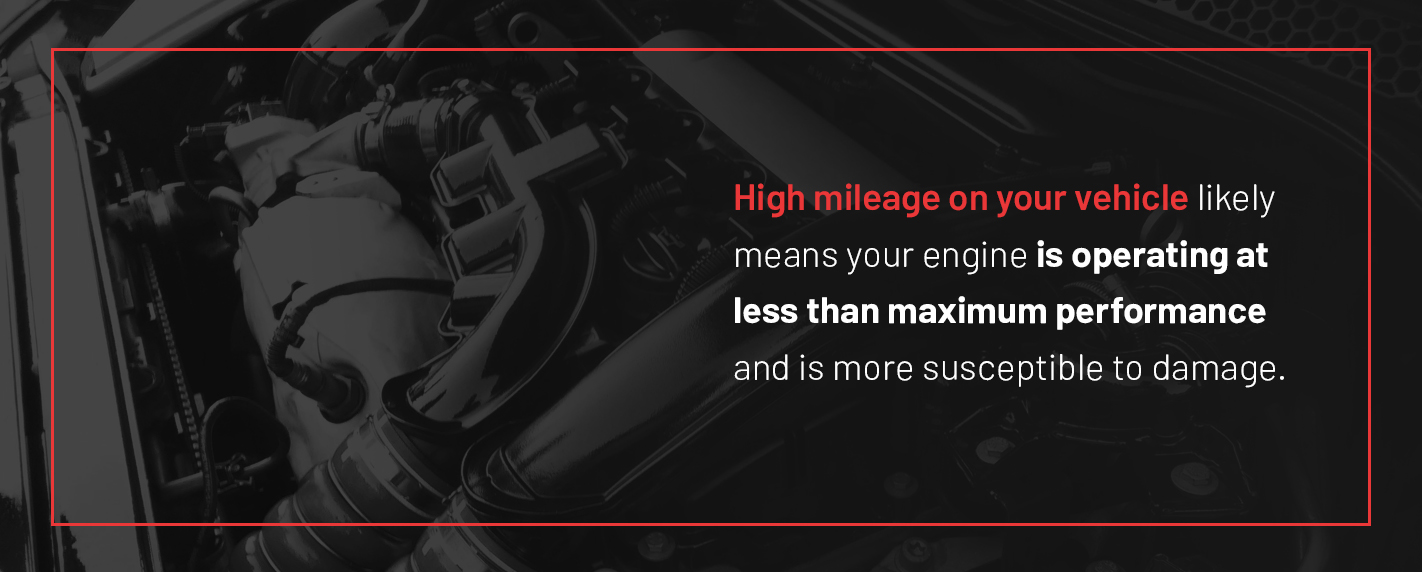
2. Older Vehicles
Similarly to vehicles with high mileage, older cars are more vulnerable to engine damage that can quickly lead to a breakdown. Older engines are also more likely to have internal rust and corrosion due to long-term exposure to engine oil and acids. When driving an older vehicle, the last thing you want is your engine to fail due to poor lubrication or lack of protective elements in your engine oil.
The best oil additives for older engines can improve engine performance by slowing the rate of oxidation in the engine to prevent corrosion and rust. Engine oil additives also keep your engine clean to reduce wear from impurities and deposits in your motor oil. When engine oil can flow smoothly with proper viscosity and lubrication, older vehicles can operate more efficiently and reliably.
3. Vehicles With Signs of Wear
Even younger vehicles with lower mileage can still receive a lot of wear and tear. If you drive your vehicle in harsh conditions, like extremely hot or cold weather, it may begin to show signs of damage early. Starting up a car in cold weather stresses the engine. Additionally, if the vehicle does warm up sufficiently, the engine oil may also be too thick and block the oil filter or cause deposit build-up.
Another cause of premature aging of an engine is not providing proper engine care. If a vehicle is not serviced regularly with periodic oil changes, the engine will not perform as it should. Some signs of early wear and tear include:
- Strange noises: If your vehicle makes unfamiliar sounds, such as thumping, knocking, grinding, hissing or squealing, this may be an indicator of engine damage.
- Unusual smells: Strange odors coming from your vehicle may also signal internal engine wear. These include smells like burnt rubber, rotten eggs, burnt fabric, gasoline and oil.
- Steam or smoke: If you see any smoke or steam coming from under the hood, this is a clear signal that it is time for a car inspection. Dark smoke coming from your tailpipe may also be a sign of an oil leak in your engine.
- Check engine light: An obvious indication that your vehicle has engine problems is your check engine light coming on. Although many vehicle owners ignore their check engine light due to past false alarms, this may be a sign of a serious engine problem, and you should always take it seriously.
Vehicles that show early signs of wear and tear can benefit from engine oil additives that improve lubrication, reduce friction and slow oxidation. Viscosity modifiers can also prevent engine oil from thickening and clogging your engine in cold weather.
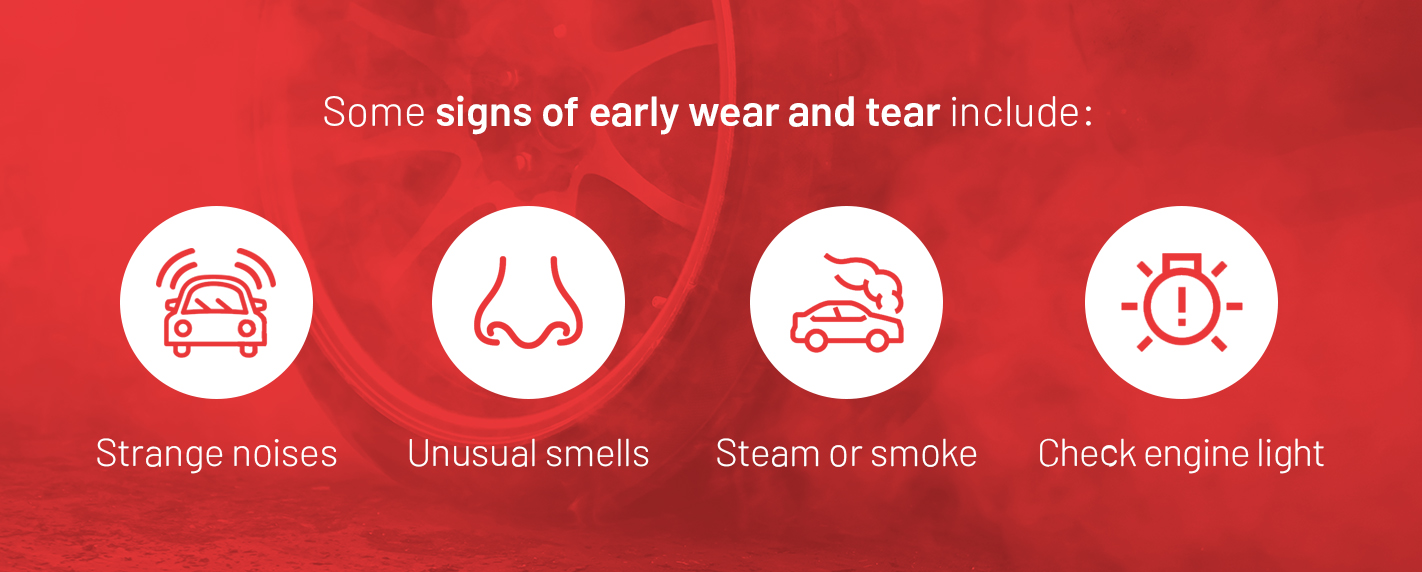
4. Vehicles With Diminished Performance
In addition to these signs of wear and tear, an engine that is not in top operating condition may result in poor vehicle performance. Diminished performance can reveal itself in several ways, including poor fuel efficiency and your engine running rough.
If your vehicle starts getting worse gas mileage than normal, this can be a sign that the compression stroke of your engine is not operating properly. This may be due to deposition build-up, engine oil leakage or lack of lubrication. The best oil additives can address all of these issues to restore engine performance.
A clogged fuel system due to low-quality oil may cause your engine to idle or run rough. Engine oil additives can reduce the build-up of deposits and improve oil viscosity to allow it to flow freely.
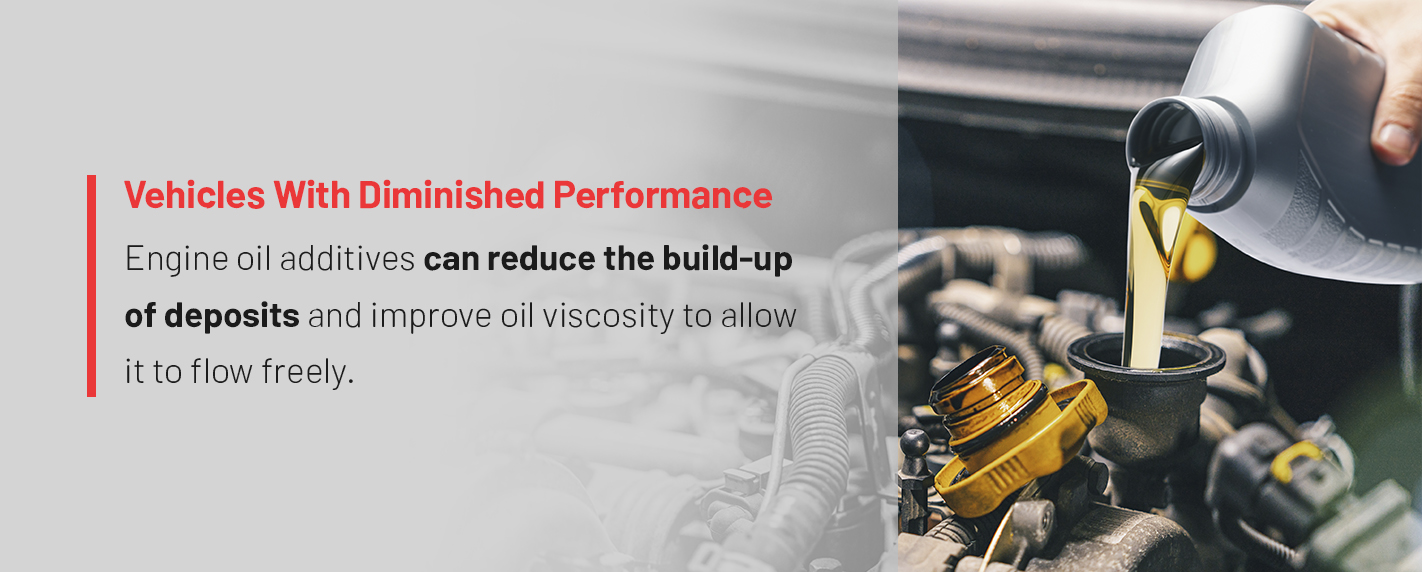
How Will an Oil Additive Benefit My Car?
High-quality oil additives can reduce engine damage over time, increase the longevity of your vehicle and improve its overall performance. Although different types of oil additives offer unique advantages, these are the primary engine oil treatment benefits:
- Reduces wear and tear: The majority of wear in a vehicle engine — more than 75% — occurs at start-up. Engine oil additives provide sufficient lubrication of all engine parts and components to prevent dry or cold starts. High-quality oil additives create a protective seal that lasts for months for a smooth start every time.
- Restores compression: Effective lubricants will also coat cylinder rings and valve guides for better sealing. This restores engine compression to improve horsepower and torque — which is especially beneficial for high mileage engines.
- Extends service intervals: Because oil additives help keep your engine operating in top condition, they provide extra protection between oil changes. By preserving the essential additives in your motor oil, aftermarket engine oil additives also extend the service life of your oil by as much as 50%. Fewer oil changes mean lower costs for you.
- Stabilizes engine oil: High-quality engine oil additives stabilize your motor oil by improving the viscosity index for reliable performance in any weather. Oil additives also prevent thermal breakdown.
- Reduces heat: When engine oil foams, this reduces its ability to dissipate heat and regulate operating temperature. By reducing foam in motor oil, engine oil additives lower friction in your engine, which, in turn, reduces heat. A lower operating temperature in your engine can also help extend the life of your engine.
- Lowers noise: Better lubrication in your engine makes it better able to absorb and cushion mechanical shocks. This results in significantly quieter operation, especially in older and higher mileage vehicles or those showing signs of wear.
- Improves fuel economy: Friction can consume almost 12% of the fuel energy in your vehicle, significantly reducing its efficiency. Luckily, proper lubrication from engine oil additives can reduce friction between engine parts to boost fuel economy. Better fuel economy is great for the environment, as well as your wallet.
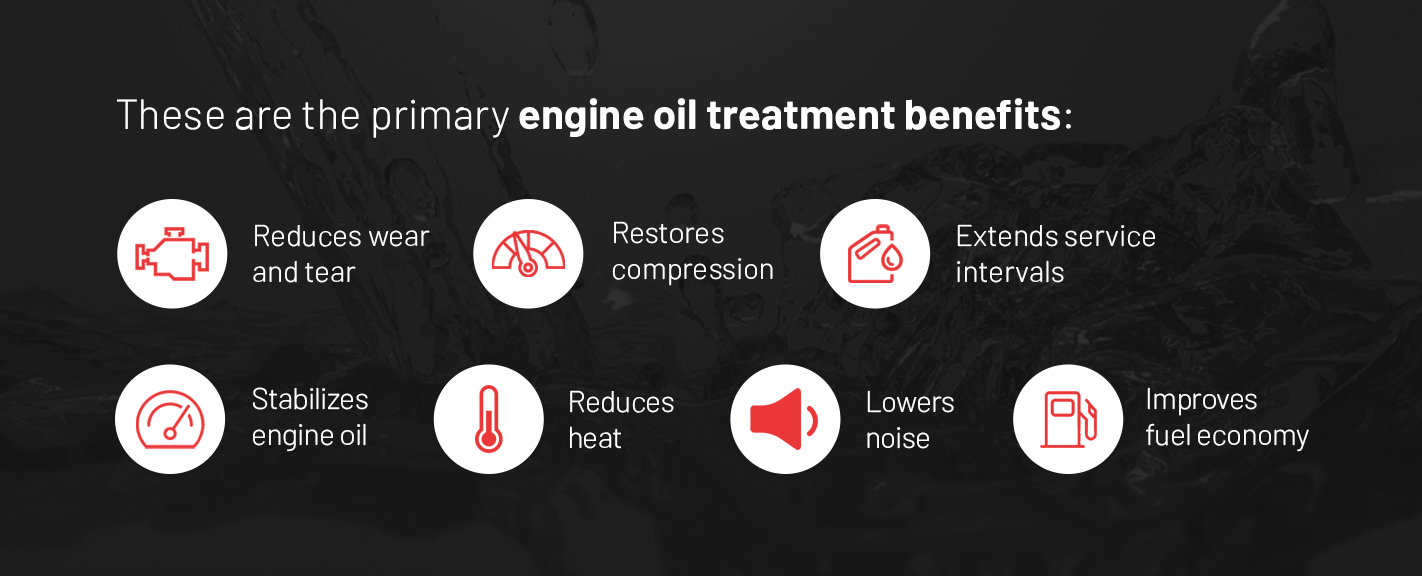
These engine oil treatment benefits make it worth considering if an aftermarket oil additive might be right for your vehicle. If you want to boost the performance and longevity of your high mileage vehicle, an engine oil additive might be the perfect solution for you.
Hy-per Lube Oil Additive
If you are looking for a high-performance aftermarket oil additive to improve the performance of your engine, look no further than Hy-per Lube Oil Supplement. Our engine additive is formulated to provide effective lubrication, reduce start-up wear, minimize engine noise, lower operating temperature, stabilize oil viscosity and prevent thermal breakdowns. A comprehensive solution in a single bottle, Hy-per Lube Oil Supplement is compatible with all petroleum and synthetic motor oils for safe use in any vehicle.
Here are a few other benefits of choosing Hy-per Lube Oil Supplement for your vehicle:
- High-quality ingredients: Hy-per Lube Oil Supplement is formulated using premium base oils and superior petroleum-extracted oil additives. These high-quality ingredients mean excellent performance and reliability.
- Compatible with any motor oil: Because Hy-per Lube Oil Supplement is 100% petroleum-based, it is compatible with petroleum and synthetic engine oil, gear oil and automatic transmission fluid (ATF). Using Hy-per Lube Oil Supplement in your vehicle will not void a new car warranty.
- Works in a wide range of engines: Hy-per Lube Oil Supplement is compatible with both gasoline and diesel engines for cars, SUVs, trucks, RVs and more. Hy-per Lube Oil Supplement is also compatible with wet clutch applications.
- More than just automotive: You can use Hy-per Lube’s high-performance Oil Supplement for much more than just your car. Our aftermarket oil additive works for industrial applications, construction equipment, tractors, heavy-duty vehicles and racing.

Designed for reliable long-term lubrication and performance, Hy-per Lube Oil Supplement is the perfect solution to support long-term engine health and improve the performance of your engine.
Contact Hy-per Lube to Learn More
When selected carefully, engine oil additives can help keep your car operating smoothly for years to come. Protective and performance-enhancing oil additives prevent wear and corrosion and boost the operation of your vehicle.
As the industry leader in high-performance and stress-tested lubricants, Hy-per Lube can help you find the perfect oil additive for your application. Contact us to learn more about our Hy-per Lube Oil Supplement or other solutions to improve the performance of your vehicle.
